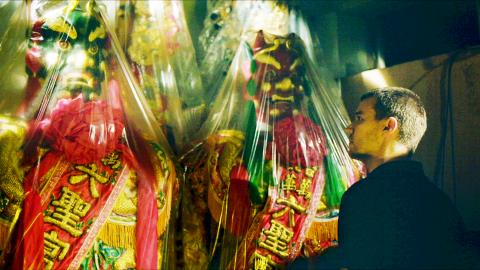When Dutch filmmaker David Verbeek visited Taiwan for the first time in 2007, he remembers being inexplicably drawn to its enigmatic charms.
“There was something about the atmosphere in the streets of Taiwan that I found very peculiar, totally different from what I had experienced anywhere else before in Europe or Asia. I couldn’t quite express it very well, but it felt mysterious, suspenseful and a little bit scary,” he says.
More than a decade later, the director’s love affair with Taiwan continues with An Impossibly Small Object, his latest feature that marks the third film that he has shot in Taipei. The movie made its world premiere at the recently-concluded International Film Festival Rotterdam and was one of eight nominees for the festival’s VPRO Big Screen Award, though it did not win. It is set for a commercial release in Taiwan on April 27.

Photo courtesy of David Verbeek
This year, a total of five Taiwanese films, including two shorts, were screened at the 47th edition of the film festival, considered by industry professionals as one of the most important in Europe. This included the world premiere of Hsiao Ya-chuan’s (蕭雅全) Father To Son (范保德), which was also in the running for the VPRO Big Screen Award, and Yang Ya-che’s (楊雅?) Golden Horse Award-winning film The Bold, the Corrupt and the Beautiful (血觀音).
In An Impossibly Small Object, Verbeek plays a Dutch photographer who takes a photograph of eight-year-old Xiaohan as she plays with her kite in a parking lot in nighttime Taipei. We are then transported into Xiaohan’s life, where she is faced with the impending separation from her childhood best friend, Hao Hao, who is migrating to New York.
The latter half of the film takes place in the Netherlands, where the photographer is confronted with his own loneliness and is reminded of his childhood by the photograph of Xiaohan.

Photo courtesy of David Verbeek
Much of the movie blurs the lines between the narrative and the documentary, with autobiographical elements of Verbeek’s experiences as a roving photographer weaved into the story. The 38-year-old even shot part of the film in his own house in Amsterdam.
Childhood, transition and displacement are central themes in the film, which also seeks to ask philosophical questions about the intricate relationship between a photographer and his subject.
“You see the struggle of the photographer because he is always traveling, and how he doesn’t feel at home anymore — this is something that I’ve also been dealing with in my own life,” says Verbeek, who has lived in Taiwan and other parts of Asia for extended periods. He is appearing as an actor for the first time in this film.
“I also wanted to make a film that was very much about photography,” he adds. “This film uses distortion of time and seeks out connections that are at first glance not there, such as the relationship between the photographer and his subject. Are the two connected somehow from the moment when the artwork, the photography, combines their existence?”
Shot within a period of three years, An Impossibly Small Object comes across as a quiet, lyrical ode to the everyday sights and sounds of Taipei. Immersive camerawork by cinematographer Morgan Knibbe takes the viewer though the corridors of aging residential buildings, sleepy alleyways, a bustling pepper shrimp restaurant along Zhongxiao Donghua (忠孝敦化) and the alluring nightscape of a city that never sleeps. The curious symbol of a life-size Chinese god puppet (神像) also recurs throughout the film.
“There is the notion that there is a deity or god in any religion that is all-seeing. This is linked to the photographer who is also an observer, whose occupation is to capture certain moments. In that sense the puppet and the photographer are one; the silent observers,” Verbeek says.
As his most “personal and experimental” film to date, the director admits that An Impossibly Small Object is a slight deviation from his previous works, which typically examine the changes in contemporary society and the nature of reality. For instance, his 2010 film, R U There, also shot in Taipei, explored the virtual world of gaming and the connection humans share with technologies and screens in the digital age.
He will be visiting both old and new ground in his next feature film, set to be shot in Shanghai where he is currently based. Titled Dead & Beautiful, the film will revolve around a group of rich people who play games with each other and begin to lose track of reality.
“My main fascination in my work is how nobody knows what reality is, and about the whole subjective nature of human experience,” he says. “This film is going to be a psycho-thriller, which is something new for me, but still containing the theme of nobody knowing what’s real, and what isn’t.”

On April 26, The Lancet published a letter from two doctors at Taichung-based China Medical University Hospital (CMUH) warning that “Taiwan’s Health Care System is on the Brink of Collapse.” The authors said that “Years of policy inaction and mismanagement of resources have led to the National Health Insurance system operating under unsustainable conditions.” The pushback was immediate. Errors in the paper were quickly identified and publicized, to discredit the authors (the hospital apologized). CNA reported that CMUH said the letter described Taiwan in 2021 as having 62 nurses per 10,000 people, when the correct number was 78 nurses per 10,000

As we live longer, our risk of cognitive impairment is increasing. How can we delay the onset of symptoms? Do we have to give up every indulgence or can small changes make a difference? We asked neurologists for tips on how to keep our brains healthy for life. TAKE CARE OF YOUR HEALTH “All of the sensible things that apply to bodily health apply to brain health,” says Suzanne O’Sullivan, a consultant in neurology at the National Hospital for Neurology and Neurosurgery in London, and the author of The Age of Diagnosis. “When you’re 20, you can get away with absolute

May 5 to May 11 What started out as friction between Taiwanese students at Taichung First High School and a Japanese head cook escalated dramatically over the first two weeks of May 1927. It began on April 30 when the cook’s wife knew that lotus starch used in that night’s dinner had rat feces in it, but failed to inform staff until the meal was already prepared. The students believed that her silence was intentional, and filed a complaint. The school’s Japanese administrators sided with the cook’s family, dismissing the students as troublemakers and clamping down on their freedoms — with

As Donald Trump’s executive order in March led to the shuttering of Voice of America (VOA) — the global broadcaster whose roots date back to the fight against Nazi propaganda — he quickly attracted support from figures not used to aligning themselves with any US administration. Trump had ordered the US Agency for Global Media, the federal agency that funds VOA and other groups promoting independent journalism overseas, to be “eliminated to the maximum extent consistent with applicable law.” The decision suddenly halted programming in 49 languages to more than 425 million people. In Moscow, Margarita Simonyan, the hardline editor-in-chief of the